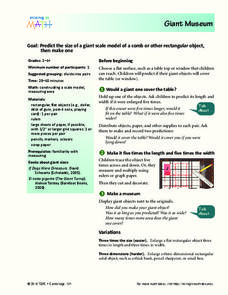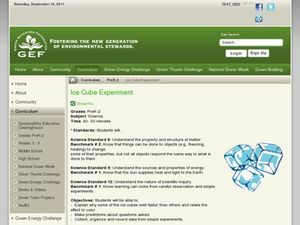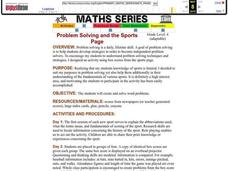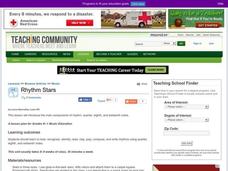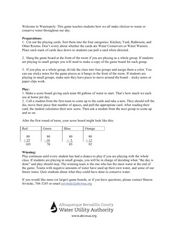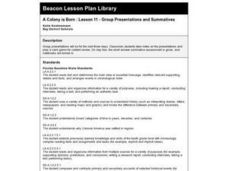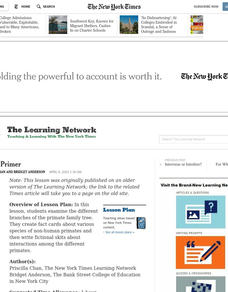Curated OER
A House is a House for Me: Library Skills for Young Readers
Read Mary Ann Hoberman's book A House is a House for Me to introduce the idea that a library is a house for shelves of books. Young readers practice alphabetizing in the picture book (easy fiction) section of the library. They learn how...
Curated OER
Giant Museum
Scholars make a giant scale model of an object. They will take a regular item and enlarge it to five times its length and width. They attempt this same concepts with a 3D model.
Curated OER
Ice Cube Experiment
Students explore the rate at which ice melts. In this science lesson, students place ice cubes on colored index cards and place them in direct sunlight. Students observe which ice cubes melt fastest and slowest.
Curated OER
Problem Solving and the Sports Page
The use of box scores from baseball games is the foundation of this math lesson. Organize your class into groups of four, and give identical box scores from a baseball game that was just played. Have them create word problems from the...
Curated OER
Take a Plane or a Train
Students listen to the song, The Wheels on the Bus. Instead of a bus, students attempt to sing the song using a different mode of transportation.
Cornell University
Fibers, Dyes, and the Environment
Nanofibers can be made through electrospinning or force spinning in order to reduce the negative impact on the environment. Pupils study the role of fibers and dye on the environment through a series of five hands-on activities. Then,...
Curated OER
Presidents
Fifth graders practice how to take notes from biographies. They take notes on the subtopic on the left side of their paper. They practice summarizing information in their own words, using short phrases. They gain information about their...
Curated OER
Irregular Word Fluency
Learners explore language arts by participating in a word fluency activity. In this irregular word lesson, students discuss the sounds that are made from different words as they read them from flash cards. Learners shuffle the flash...
Curated OER
Pocket Facts
Second graders recall addition and subtraction facts for the numbers 0-9. They review facts written on pocket-sized cards. Students select an unknown addition or subtraction fact to place in their pocket. They carry this fact with them...
Curated OER
Presidents
Fifth graders explore the encyclopedia and take notes from it in a formatted way. They analyze and compare the encyclopedia to an almanac and begin to take information on their chosen president.
Curated OER
The Research Paper
Students demonstrate a working knowledge of how to produce bibliography cards using MLA Documentation. They organize information from a variety of sources and credit sources for both quoted and paraphrased ideas.
Curated OER
Special Delivery—Handle with Care
Students explore the concept of philanthropy. In this service learning lesson, students visit a retirement home with their classmates. Students deliver cards and plants to the residents there.
Curated OER
Rhythm Stars
Learners listen, clap, compose and identify various rhythms. In this rhythm lesson, students practice rhythm with rhythm cards. Learners become familiar with stick notation. Students glue Popsicle sticks to illustrate rhythms.
Curated OER
Climate Change
Students read about climate change and pair share. In this climate change lesson, students take notes on a worksheet from the readings. Students each read a part of an article and share what they have learned.
Curated OER
Biology Biographies
Learners create a project about a famous Biologist in order to appreciate the humanity of the people involved in doing science. They create scientist biography "cards" roughly modeled after baseball cards or create a scrapbook of a...
Curated OER
Wateropoly: Life in the Desert
Students explore water properties by participating in a drought related board game. In this water conservation lesson, students play a game titled "wateropoly" which is based on the classic board game Monopoly. Students utilize cards and...
Curated OER
Tell It Like It Is
Students consider the accuracy of the Web sites they regularly use, then prepare for a formal debate on the reliability of Wikipedia and similar Web sites. For homework, they prepare note cards and practice delivering their orations.
Curated OER
A Colony is Born : Lesson 11 - Group Presentations and Summatives
Fifth graders give presentations on colonial research. The others take notes on the presentations. They play a card game which helps them review content. They take a summative assessment and present their research notebooks.
Curated OER
Battle of "The Cents"
Learners explore money. In this counting money lesson, students play a card game using the rules of "War." Learners turn over cards, determine the money value represented, and the student with the highest value keeps the cards.
Curated OER
Primate Primer
Young scholars examine the different branches of the primate family tree. They create fact cards about various species of non-human primates and then write fictional skits about interactions among the different primates.
Curated OER
Ecology of the Savanna-Forest Boundaries in Central Brazil
Students explore photosynthesis. In this photosynthesis instructional activity, students label parts of photosynthesis and take notes. Students conduct experiments on leaves, make observations and record their findings.
Curated OER
Letter Sound Fluency
Young scholars practice letter sounds. In this phonemic awareness lesson, students practice saying each letter sound by playing a game. Young scholars use index cards that have letters printed on them and say the letter sound. Students...
Curated OER
The Planning Commission
Students design a sound community. In this communities lesson, students take on the role of city planners and identify the needs of the community. Students develop a blue print to meet the needs of the community and include new...
Curated OER
Barter and Trade
Students explore the concepts of bartering and trading. In this algebra lesson, students barter with each other for different items. They use special cards to designate ownership of an item as they explore the complexity of bartering.



